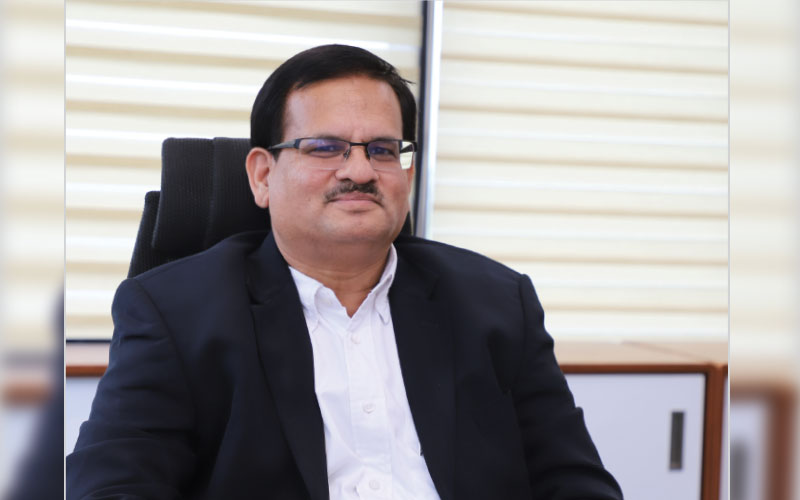Parason has observed a growing interest among Indian mills in adopting smart technologies such as sensors, automation, and AI-driven controls. To address this demand, the company has developed scalable and modular automation solutions that are both cost-effective and easy to integrate. In an exclusive interview with Paper Mart, Dr. Shekhar Desarda, Chairman & MD of Parason, discusses the extensive deployment of PLC (Programmable Logic Controllers), SCADA (Supervisory Control and Data Acquisition), DCS systems, smart sensors, and robots across the company’s product range. These innovations enable real-time monitoring, smart process control, lower operational costs, and faster ROI, significantly boosting the mills’ overall efficiency.

Paper Mart: Could you explain your company’s key offerings and their relevance to the Indian pulp and paper industry’s dynamic needs?
Shekhar Desarda: At Parason, we are a global provider of advanced machinery and smart wear parts, for the pulp and paper industry. Our offerings range from complete turnkey solutions tailored for the pulp and paper industry, along with engineering services and world-class equipment along with all types of spares.
Designed to meet international standards, our solutions are built to address both high-performance demands and local operating conditions. Our offerings include energy-efficient, cutting-edge machinery that meets global quality standards without compromising on delivery timelines.
With a deep understanding of the industry’s evolving demands, we also supply spare parts compatible with all major Original Equipment Manufacturers (OEMs)—ensuring operational continuity and reduced downtime for Indian mills —making us a trusted technology partner.
Watch: In Pursuit of Lesser Water Footprint
PM: In recent years, have you introduced any new products, upgrades, or solutions specifically designed for Indian paper mills? What gap in the market were they trying to fill?
SD: Innovation is at the heart of everything we do. Innovation drives our global strategy, and India remains a key focus market.
One of our latest advancements is the Tangential Refiner—an energy-efficient, modified TITO refiner designed with Indian mills in mind.
Parason’s Tangential Refiner delivers up to 25% energy savings compared to conventional designs and offers a rapid return on investment within just a couple of years.
It addresses the pressing market need for low-energy, high-performance refining equipment, ideal for mills focused on operational cost savings without compromising quality.
We even got the committed result with it recently, in one of the Indian paper mills.
PM: Could you describe the typical technological and operational issues in Indian mills and explain your company’s approach to resolving them?
SD: Indian paper mills often face challenges like high energy consumption, frequent maintenance, outdated machinery, and dependency on imported machinery with long lead times.
Parason bridges this gap by offering energy-efficient, robust, and easily maintainable machinery. Our approach involves close collaboration with mill operators to customize solutions that reduce the total cost of ownership, enhance uptime, and improve consistency across operations.

Our product design philosophy emphasizes modularity and scalability. By customizing machinery to suit individual client needs, we ensure optimal performance within budget.
PM: Sustainability is a growing priority. How do your solutions help mills reduce water and energy consumption, emissions, or chemical usage? Can you share a recent case study or implementation?
SD: At Parason, sustainability isn’t just a feature—it’s a fundamental principle guiding our engineering and innovation. We are deeply committed to designing solutions that significantly reduce energy consumption, optimize water usage, and limit chemical dependency.
Our approach begins by understanding the root challenges mills face and then developing purpose-driven technologies that deliver measurable, long-term benefits.
To illustrate, one of India’s leading integrated paper mills recently adopted our latest energy-efficient refiners. Post-installation, they experienced a substantial reduction in both power consumption and chemical usage—contributing directly to their sustainability targets and ESG commitments. This is a proud testament to how Parason’s solutions are shaping a cleaner, more responsible future for the industry.
PM: Given the increasing digitalization, to what extent have Indian mills integrated smart sensors, automation, and AI systems? What are the key enablers or barriers in your view?
SD: Digital transformation is no longer optional—it’s essential. We are witnessing a growing interest among Indian mills to adopt smart technologies such as sensors, automation, and AI-driven controls.
While large mills are already moving forward on this front, the pace of adoption in small and mid-sized operations remains modest, primarily due to cost concerns and limited access to technical expertise.
At Parason, we recognize this gap and are actively working to close it. We’ve developed scalable and modular automation solutions that are both cost-effective and easy to integrate.
Our approach allows mills to adopt Industry 4.0 technologies in phases, based on their readiness and operational goals.
We extensively deploy PLC (Programmable Logic Controllers) and SCADA (Supervisory Control and Data Acquisition), DCS systems, smart sensors, robots across our product range, enabling real-time monitoring, smarter process control, and improved plant efficiency.
More importantly, we back this with dedicated training, on-ground support, and data-driven performance optimization. The response from our clients has been overwhelmingly positive, reaffirming our belief that digitalization is the future—and that future is already underway.

One of our latest advancements is the Tangential Refiner an energy-efficient, modified TITO refiner designed with Indian mills in mind.
PM: Mill owners often demand a balance between performance and cost. How do you ensure your technologies remain both efficient and economically viable, especially for small and mid-sized mills?
SD: We believe that efficiency shouldn’t come at the cost of affordability. Our product design philosophy emphasizes modularity and scalability. By customizing machinery to suit individual client needs, we ensure optimal performance within budget. Moreover, our equipment’s lower operational cost and faster ROI make it particularly attractive to small and mid-sized mills.
PM: Many Indian mills face inconsistency in raw materials and quality variability. Can your technology or machinery help bring more stability or predictability to mill operations? How so?
SD: Our advanced machines and systems are designed to adapt to varying raw material inputs, including recycled fibers and agro-residues. With intelligent flow designs and specialized wear parts, Parason’s machinery enables mills to maintain consistent pulp quality even with fluctuating feedstock. In fact, we work closely with mill teams to fine-tune process parameters and stabilize quality output—bringing predictability to daily operations.
PM: Are you investing in ‘Make-in-India’ or localization efforts in terms of manufacturing, support, or technology customization?
SD: Parason is a proud supporter of the ‘Make-in-India’ initiative. With global R&D inputs and world-class manufacturing units across India, we are delivering international-quality machines tailored for local needs. Beyond manufacturing, we localize service and spare part support, ensuring faster response and lower lifecycle costs.
What truly sets us apart is our agility and responsiveness. Our global reach is complemented by an agile and deeply rooted Indian manufacturing ecosystem.
Also Read: JMC Paper Tech Driving Innovation and Sustainability in the Global Paper Industry
PM: Looking ahead, what kind of innovations or technological shifts do you foresee reshaping the Indian paper industry in the next 3–5 years?
SD: We see a definitive move toward digitalization, energy optimization, and sustainable fiber processing. Future-ready equipment integrating AI, IoT, and smart diagnostics will redefine reliability and operational control. Simultaneously, innovations in handling alternative raw materials like agri-residues and recycled paper will become more prominent. Parason is actively investing in these future technologies—ensuring Indian mills stay competitive and sustainable in the global arena.

With intelligent flow designs and specialized wear parts, Parason’s machinery enables mills to maintain consistent pulp quality even with fluctuating feedstock.



